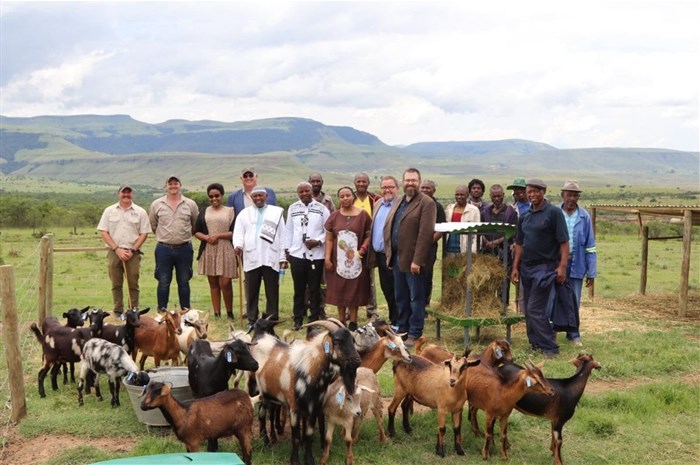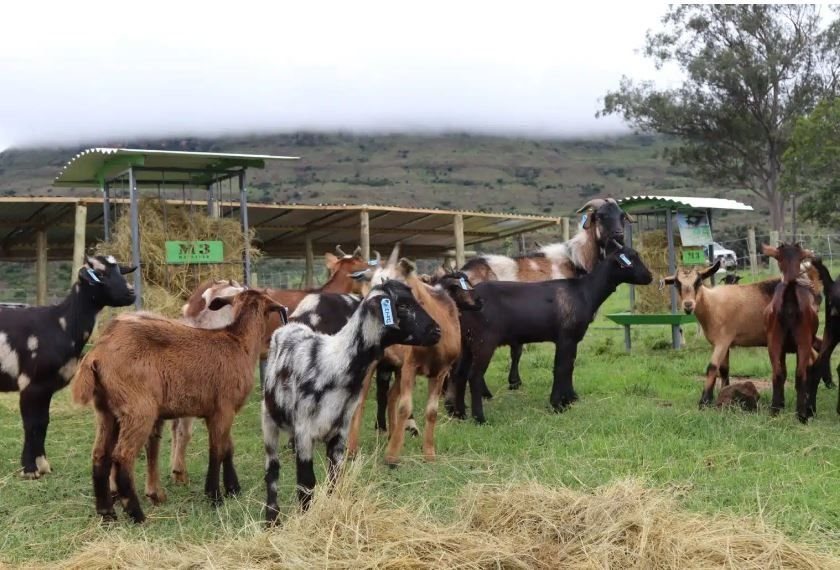iNkosi Zwelothando Mabandla, AfriForum and the family farmer network the Southern African Agri Initiative (Saai) yesterday launched the joint indigenous veld goat agricultural development project in the AmaBhele kaJamangile Kingdom close to Maclear in the Eastern Cape with the delivery of the first 21 Nguni indigenous veld goats to iNkosi Zwelothando's farm, Mncetyane. Gerhard Lourens, of LGL Indigenous Veld Goat Skilder Stud, also provided practical training to community members and iNkosi Zwelothando and his team.

Members of the AmaBhele kaJamangile royal family and community with AfriForum and Saai members, as well as the LGL Indigenous Veld Goat Skilder Stud.
This joint project has a planned duration of six years. The base herd consists of a total of 41 Nguni indigenous veld goats that are procured over two years. The aim of the project is to establish one profitable and sustainable indigenous veld goat herd farming enterprise and the next three indigenous veld goat development projects at the end of the six-year period. The transfer of knowledge and skills relating to all aspects of a goat herd farming enterprise, also to community members, is an integral part of the project plan that will also be of benefit to the broader community.
“It was a big day for us. The goat herd that are now standing here in the pen is the result of good cooperation and hard work that was done over months. I am also glad that AmaBhele kaJamangile community members could benefit from the training that was done [yesterday]. This is a next step in our community’s journey towards self-sufficiency,” says iNkosi Zwelothando of the AmaBhele kaJamangile Traditional Community.

Nguni indigenous veld goats
Going beyond subsistence farming
“It is a privilege for Saai to add value to these family farmers on grassroots level with training and exposure to stud farming and its commercial value through our involvement with this agricultural development project. iNkosi Zwelothando and the other family farmers in his kingdom are experienced goat farmers. We are not busy establishing subsistence farmers, but are supporting family farmers to develop to become commercial farmers that will contribute towards wealth creation and food security and therefore economic growth and stability,” says dr Theo de Jager, chairperson of the board of Saai.
“We as Jamangile kaMabandla royal family have a vision to establish the community, which we are serving as leaders, as an autonomous, self-reliant community. We understand that this is not something that happens without planning and hard work and that it must be built step by step. [Yesterday] we laid another brick for the future that we are busy building,” says Princess Bhelekazi Mabandla, head of royal diplomatic services of the Jamangile kaMabandla Royal Family.

Kallie Kriel of AfriForum with iNkosi Zwelothando Mabandla
“The happiness and prosperity of the future generations of the different cultural communities in southern Africa depends on us, the current generation. It is our generation’s task to build good intercultural relations and cooperation based on mutual recognition and respect. This project serves as an example of community collaboration, that can be followed as an alternative approach, to ensure a future where the welfare of communities takes centre stage.
"Intercultural collaboration projects that promote community self-sufficiency, of which this project is one example, is the practical building blocks of a network of cultural communities that are currently taking shape. This network will strengthen community federalism and will thereby contribute to ensure a free, safe and prosperous future for cultural communities at the southern tip of Africa,” says Barend Uys, Head of Intercultural Relations and Cooperation at AfriForum.



































